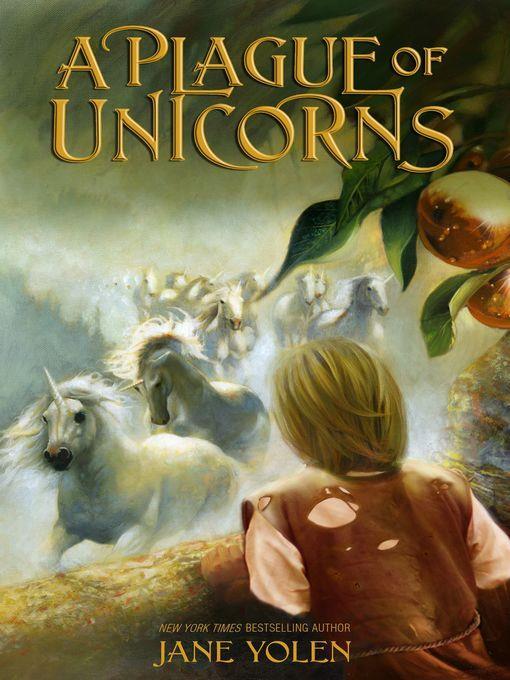
A Plague of Unicorns
فرمت کتاب
ebook
تاریخ انتشار
2014
Reading Level
5
ATOS
6.2
Interest Level
4-8(MG)
نویسنده
Jane Yolenناشر
Zonderkidzشابک
9780310746102
کتاب های مرتبط
- اطلاعات
- نقد و بررسی
- دیدگاه کاربران
نقد و بررسی

pickletiger - This book is absolutely amazing. You actually learn a little about how life was centuries ago while indulging in some great fantasy writing. If you like the dark ages and you like unicorns than you will love this book.

October 20, 2014
Yolen (Owl Moon) weaves a magical yet believable tale of myth and magic in this charming middle-grade fantasy. In the mythical kingdom of Callanshire, James, son of the Duke of Callander, is sent away at age nine to study at Cranford Abbey. The abbey, struggling to stay financially solvent, plans to make its extraordinary golden Hosannah apples into cider for sale. Unfortunately, unicorns also love these delicious apples. No matter how the monks try, they cannot get rid of the horned orchard raiders until James summons a singer named Sandy, who may have a way with unicorns. James is a hero to be emulated: he is curious, brave, and caring. His family and the monks are all well-drawn, with delightful details (James nicknames his tutor, Benedict Cumber "Cumbersome," for his dry delivery of obscure facts; Alexandria, James's sister, has eyes "like Spanish steel"). Though partially set in an abbey, this tale avoids an overt religious message. It does, however, offer a winsome example of how to live life responsibly. Ages 8â12. Agent: Elizabeth Harding, Curtis Brown.

October 15, 2014
A whimsical fairy tale is stretched rather thin in this low-key novella. James, heir to the duchy of Callanshire, has spent most of his 8 1/2 years asking nonstop questions, until his loving but exasperated family ships him off to Cranford Abbey to be educated. But the monks are otherwise preoccupied with driving off the unicorns that feast upon their apple orchard. Countless heroes have tried and failed to stop the annual raids; how can one clever and homesick little boy come up with the perfect solution? Yolen (who simply cannot write a graceless sentence) displays her strengths here: poking fun at heroic stereotypes, celebrating curiosity and imagination, and revealing both the homely everydayness of the magical and the wondrous beauty of the ordinary. Each individual vignette-charming, witty, poignant and dreamlike-is perfect in itself; yet stitched together, the awkward shifts in viewpoint and tone betray the narrative's origin as an expanded short story. It is difficult to identify a target audience: The sophisticated prose and subtle themes are suited for middle-graders, but few are likely to identify with such a young protagonist; this might work best as a classroom (or bedtime) read-aloud. The handsome design complements Yolen's prose. Sweet and engaging but less than the sum of its parts. (Fantasy. 8-12)
COPYRIGHT(2014) Kirkus Reviews, ALL RIGHTS RESERVED.

November 15, 2014
Grades 3-6 Based on a story published in Yolen's Here There Be Unicorns (1994), this enjoyable chapter book intertwines two initially separate narratives. The first, set in medieval Cranford Abbey, tells of the monks' many unsuccessful attempts to stop unicorns from eating the finest apples in their orchard. The second concerns eight-year-old James, a duke's son, who, after wearing down his family with constant questions, is sent from his castle home to Cranford Abbey to complete his education. There he uses his courage, his mind, and his connections to solve the abbey's dilemma. Both settings, the abbey and the castle, come alive through the description of their physical characteristics and, even more, the personalities, mindsets, and activities of the individuals living there. The one fantasy element is so smoothly assimilated that it seems just another difference between the present and the medieval past. While some young readers may be disappointed that James is not the hero in a traditional sense, those who choose the book by its cover will be well satisfied.(Reprinted with permission of Booklist, copyright 2014, American Library Association.)

























دیدگاه کاربران